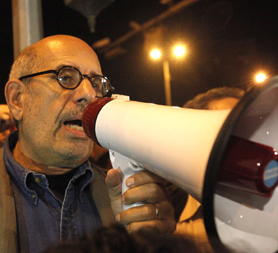Cameron: ‘Repression of Egypt protests will end badly’
David Cameron warns that any attempt to repress anti-government protests in Egypt will “end badly” for Egypt and the world.

The Prime Minister warned Egypt that repression of anti-government protests would “end badly” but did not echo protestors’ calls for President Hosni Mubarak to resign.
He said: “It’s very important that if it’s President Obama or whether it’s me, we’re not saying who should run this country or that country.
“It’s sensible to say that you do have a choice here. This repression, if you opt for that, that will end badly for Egypt, badly for the world. It’s the wrong choice to make,” he added.
On Sunday night, Egypt’s most prominent democracy advocate called for President Mubarak to step down, speaking to thousands of protesters who paid no heed to a curfew for a third night in Cairo.
Nobel Peace laureate Mohamed ElBaradei’s appearance in Tahrir Square highlighted the jostling for leadership of the mass protest movement that erupted seemingly out of nowhere in the past week to shake the Arab world’s most populous nation.
On Sunday, fighter jets flew low overhead and police returned to the capital’s streets, and Army vehicles were deployed to main streets and bridges over the Nile.
Up to 10,000 protesters gathered in the main square on Sunday, and even after the 4pm curfew, they numbered in the thousands.
In a further sign of Mubarak’s dimishing position after three decades in power, his key ally, the US, called for an “orderly transition to democracy.”
Protesters have dismissed Mubarak’s gestures of reform, including the sacking of his Cabinet and the appointment of a vice president and a new prime minister.
ElBaradei, the former head of the UN nuclear watchdog agency, has gained a following among young secular democracy activists with his grassroots organising.
But some demonstrators regard him as an expatriate, long removed from Egypt’s problems.
The outlawed Muslim Brotherhood, which wants to establish an Islamist state in Egypt, has made some statements that it was willing to let ElBaradei act as point man for the movement.
But it also appeared to be moving for a more prominent role after lying low when the protests first erupted.
Cameron, Obama call for calm
Mr Cameron and President Obama have called for an “orderly transition” to a democratic government in Egypt.
As the crisis engulfing President Mubarak escalated, the two leaders held talks and gave the strongest indication yet that they do not envisage him hanging on to power.
The Foreign Secretary, William Hague, stressed that Egypt was a “sovereign nation” and Britain was not trying to “pick who should be president”.
However, he insisted there should be smooth and peaceful reform, raising concerns that extremists could seek to exploit any power vacuum.
“What matters is that the process takes place, whatever that means for President Mubarak personally, whatever he judges that means for him personally,” Mr Hague said.
“It is important for him to initiate that transformation and that broadly-based government, and that is what we would like to see.
“That is far preferable of course to Egypt falling into the hands of extremism or a more authoritarian system of government.”
On Sunday, Mr Hague indicated that the UK would be concerned if 82-year-old Mr Mubarak was replaced by the Muslim Brotherhood, a conservative religious group seen as one of the main opposition forces.
Gangs of armed men are reported to have stormed four jails across Egypt yesterday, helping to free hundreds of Muslim militants and thousands of other inmates.
Advice to British nationals
The UK and US have now advised their nationals to leave volatile areas if possible.
The army has sent hundreds more troops and armoured vehicles on to the streets of Cairo and other cities, and jets have been flying low over the main square in the capital.
Mr Cameron personally spoke to the embattled president on Saturday to express his “grave concern” about violence against the anti-government dissidents.
In a separate joint statement with French President Nicolas Sarkozy and German Chancellor Angela Merkel, the Prime Minister said: “The Egyptian people have legitimate grievances and a longing for a just and better future.”
A Downing Street spokeswoman said Mr Cameron and Mr Obama had discussed their “shared and deep concern” at the crisis in a telephone call last night.
“The Prime Minister and President Obama were united in their view that Egypt now needed a comprehensive process of political reform, with an orderly, Egyptian-led transition leading to a government that responded to the grievances of the Egyptian people and to their aspirations for a democratic future,” the spokesman said.